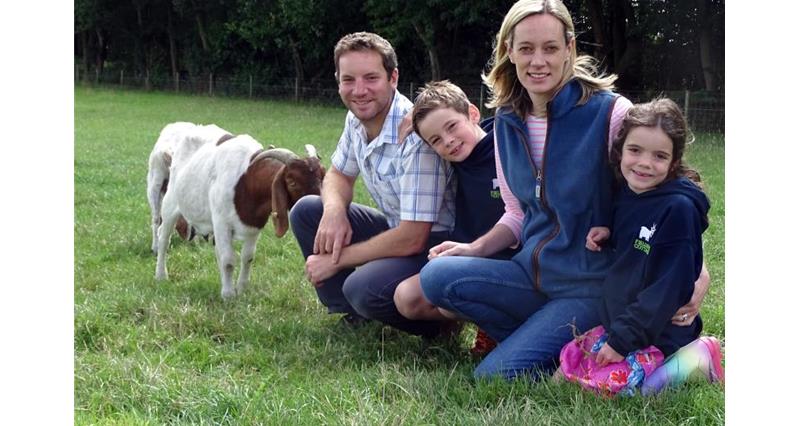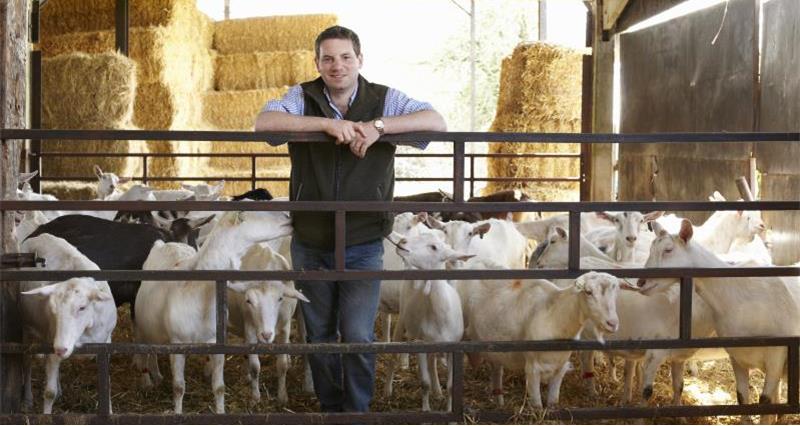He was determined to forge a career in farming and Sophie, the Jersey cow bought for him by his parents, was the first step towards that goal.
“It all started there. I bred Sophie, buying and selling calves and milking her by hand. I sold the milk to Mum and then had it on my cereal before school. All the income and expenditure was recorded in a cash book, which I still have now,” said Sam.
Today Sam and his wife Caroline run Fielding Cottage, an award-winning farm-based business at Honingham that sells goats cheese, as well as a range of skin care products made with goats’ milk.
Sam works part-time selling poultry equipment across the East of England as well and they have developed holiday cottages at Honingham that also double as accommodation for residential cheese-making courses.
It has been hard work, with many challenges along the way, but Sam is pleased with the business they have built and the reputation they have earned for the quality of their cheese.
“It’s an exciting time for us and we are developing the business in lots of ways,” he said.
“It really has been blood, sweat and tears but belief, determination and not taking no for an answer have paid off. If you want something enough, and believe in it, you can make it happen.”
Sam’s first job was with sheep farmer David Moore at Saxlingham Nethergate. He then went on to rent grass and buildings from Jack Averill at Stoke Holy Cross and used money raised from this cottage cattle industry to buy a pedigree Simmental cow.
“Mr grandfather Russell Steggles was one of the first people to import pedigree Simmental cattle into the UK, under the Wacton prefix. I managed to buy and sell enough calves and keep some money in the bank so I bought a pedigree Simmental. I kept building up the Simmental herd and my grandfather let me share the Wacton prefix,” he said.
Sam sold his cattle when he went on to college, studying at Writtle and Harper Adams, where he undertook an HND in agri-food marketing with business studies.
After leaving university he joined a firm selling poultry equipment but he continued to investigate different ways to get back into farming.
“I saw various options, including an article on goats, and I kept coming back to that. I did some research and discovered there was no one in Norfolk making goat cheese,” he said.
Sam said it was the unexpected death of Caroline’s sister, Lucie, that gave him the impetus he needed to start the new business.
“Life’s too short and if you’re thinking of trying something, try it,” he said.
“So that’s what we did. Our son William was just three months old and we went on holiday up to Cumbria and came back having agreed to buy 10 goats.

“We were living in a house, with no land, so I approached a friend of mine who had recently got out of pigs, hoping to rent out his pig buildings. My heart sank when he said no, but he instead took me to look at a redundant dairy. We hired that and set about building our goat business from there.”
The business had humble beginnings, with a milking parlour constructed out of pallets and baler twine, a row of domestic fridges serving as a milk tank and milk stored in plastic buckets.
The goats kidded in May 2010 and Sam travelled to West Highland Dairy in the north west of Scotland for a three-day course on cheese making.
He hoped that a Norfolk Young Farmers competition called the Growing Business Award would help boost the fledgling business. Backed by five organisations, this was offering a £5,000 first prize to someone with a business idea or who already had a business. Entrants had to submit a business plan and present it to a panel of judges.
“I took some cheese along to my presentation but I messed up the percentages and put 20% salt in rather than 2%. The judges were there coughing and spluttering away and I thought I’d blown it, but as luck would have it I managed to secure the award,” said Sam.
“It was presented at the Royal Norfolk Show in the June and then we were able to buy our cheese-making equipment and acquire a unit to make it in.”
They started with an 8ft by 20ft container, which had been used at the show as the baby changing and breast-feeding facility. The cheese went down well with family and friends but wasn’t making them any money so they decided to start selling it via farmers’ markets. They began at Diss in August 2010 and managed to sell all their stock.
“From there we travelled to farmers’ markets all over Norfolk and in London as well. We were doing 18 a month at our height. Meanwhile I was still driving 1000 miles a week with the poultry business and we were milking goats twice a day and making cheese at night,” said Sam.
They were milking 300 goats at Ellingham and built a new cheese-making facility at Honingham. However, the logistics of moving the milk between the two proved challenging and time-consuming.
Sam said: “We realised we would need to spend a lot of money to bring the goats to Honingham but we didn’t have enough sales to warrant the investment. We decided to sell the goat herd and now we buy-in milk from several suppliers and handle the processing here, which works very well.
“I do miss milking the goats. There was something therapeutic about it, I guess, but I have always been a morning person. However, I don’t miss the break downs, the frozen milking parlours in the middle of winter or the worry of defrosting water pipes.
“We still have a few goats here but William is the goat entrepreneur. He’s in charge of those and he has a cashbook exactly like I had at his age.”
Fielding Cottage produces up to 10 tonnes of cheese a year across the range and a growing volume is sold through distributors and wholesalers. They supply supermarkets including East of England Coop and local Morrisons stores, with another major supermarket about to come on board.
“We have also built some residential accommodation for cheese-making courses and holiday cottages. People can come and stay with us and learn how to make cheese on a five-day course,” said Sam.
“Both the cottages and the dairy were developed with the help of RDPE funding, which was a great help, and we’ve been fortunate all the way through that people have supported us.
“Without the Growing Business Award we would never have had the start we did and without the support from lots of other people, and the belief that they had in us, we wouldn’t have been able to achieve what we have.
“I can’t emphasise enough that all of this comes down to the team of people you have around you. I couldn’t have done it without them. I’m really just the front man.
“If I was asked if I would do anything differently, I would say no, absolutely not. If someone had given me £2 million I could have built a large state-of-the-art cheese factory but I wouldn’t have the story behind it or the understanding of the business.
“I will do anything, from cleaning the holiday cottages to making cheese, and that’s the mindset of those working for us as well. We’re just trying to build something that everyone will be proud of.”
The Fielding Cottage Cheese Range
Ellingham, their original cheese, a soft, feta type goat cheese
Wensum White , a brie style goat cheese, the newest in the range
Norfolk Mardler, a harder waxed, eight week matured goat cheese, yellow wax and green label in the colours of Norwich City
Goat Curd, a smooth, spreadable version of the Ellingham goat cheese.
To find out more go to www.fieldingcottage.co.uk
